Estonian university cuts ties with Israeli institution, drawing government rebuke
An Estonian university has cut ties with an Israeli university, setting off a chain of rebukes from the government, and pressure from its board.
The rector of the Estonian Academy of Arts, or EKA, now says the decision to cut ties will be reviewed. The rector, Mart Kalm, also said critics of the decision had misinterpreted a “technical matter” for an ideological one.
“I should apologize for my imprecise wording, which has upset people, taken on a life of its own, and allowed misunderstandings to arise,” Kalm said on an Estonian news show.
The firestorm erupted after EKA canceled a design anthropology workshop with a visiting Israeli professor last week. The workshop with Jonathan Ventura, a professor at Shenkar College in Tel Aviv, was slated for February.
EKA also said it now has no partnerships with Israeli or Palestinian universities, citing “difficult international and in-house sentiments” surrounding Israel’s war in Gaza. In a statement on Tuesday, the university said that it “sympathises with all those who are suffering in the current war.”
The statement added, “EKA wants to provide a safe study, work and creative environment for its members, students and staff, regardless of generation, religion or worldview.”
Estonian Prime Minister Kristen Michal rebuffed the move in a press conference, saying, “I believe the academy should reconsider this decision.”
He was joined by Minister of Foreign Affairs Margus Tsahkna, who said EKA took “a step in the wrong direction” considering Estonia’s friendly relations with Israel. (When the country recently supported a United Nations resolution calling on Israel to end its occupation of Palestinian territories, the Estonia–Israel Parliamentary Friendship Group of the Riigikogu, or parliament, called the move a regrettable departure from the norm.)
Tsahkna also encouraged the university’s council, akin to a university board in the United States, to intervene in the decision. The council did just that after a meeting on Tuesday.
“The council advised the rector, together with his colleagues, to look at this issue, which has now become a much bigger issue, once again, and consider all the pros and cons,” said EKA Council Chair Maria Mägi-Rohtmets.
Before signaling that he would review the decision, Kalm told Estonian media that EKA’s decision aligned with “most art universities in Europe.” A wave of European schools severed ties with Israeli institutions or agreed to divest from Israel-linked companies earlier this year, following student protests against Israel’s actions in Gaza in its war against Hamas.
Kalm also said he had corresponded with Israeli schools that “expressed their understanding” based on international sentiments opposing the war in Gaza.
Ventura, the Israeli professor whose workshop was canceled, told media that he wanted to avoid a flare of tensions, which he said he had already experienced at universities in Switzerland.
Some members of Estonia’s Jewish community have joined in the criticism of EKA. The country is home to about 2,000 Jews.
Alla Jakobson, chair of Estonia’s Jewish communal body, said it was “unacceptable” to end relations with Israeli scholars and students for “political reasons” and accused the university of contributing to an environment that fostered antisemitism.
“This decision sends out a worrying signal that undermines academic and cultural ties between Estonia and Israel,” the communal body said in a statement. “It is also contrary to the principles of academic freedom, international exchange of knowledge and cultural dialogue, and to the commitments made by the Estonian state when signing the IHRA definition of antisemitism in 2007.”
Tel Aviv-area school hit by Houthi missile fired from Yemen
A ballistic missile fired from Yemen severely damaged a Tel Aviv-area school early Thursday morning, in some of the most significant damage yet in an ongoing barrage from Houthi rebels based there.
No children were present at the school in the suburb of Ramat Gan, which officials said would be rebuilt, and would reopen in another already constructed building within weeks.
The rocket, which Israel partially intercepted, was fired as Israeli fighter jets were on their way to Yemen to target Houthi positions there. Dozens of jets targeted sites in two cities, including the capital of Sanaa, and Israeli officials said they believed they had debilitated the Houthis’ operations in three ports.
The Houthis have fired hundreds of missiles at Israel and ships in the Red Sea since the beginning of Israel’s multi-front war, following Hamas’ Oct. 7, 2023 attack.
“When Israel acts against the Houthis, it acts for the entire international community,” Israeli Prime Minister Benjamin Netanyahu said in a video statement.
Fragments from Israel’s interceptor missile landed in the central city of Modiin and near Israel’s parliament, the Knesset, in Jerusalem.
The targeted attack on the Houthis comes as Israel’s military has recently barraged Hezbollah in Lebanon, Iranian military sites, and Syrian military targets amid the government collapse there, collectively undercutting threats from Israel’s top adversaries. It is still battling Hamas in Gaza amid signs that a ceasefire and hostage-release deal could be in the works there.
Sufganiyot in the city: Where to get Hanukkah donuts in NYC this year
It may seem like it’s taking forever for Hanukkah to arrive this year. But the holiday is finally around the corner — the first night of Hanukkah is on Wednesday, Dec. 25.
That means Israeli-style donuts known as sufganiyot are getting cranked out in large numbers around New York City. Like latkes, donuts are fried in oil, echoing the miracle of the oil that burned for eight days in the rededicated Temple in Jerusalem in the Hanukkah story.
“Real sufganiyot are not Dunkin Donuts donuts,” said Rafi Shaul, the owner of Taste of Israel bakery in Midwood, Brooklyn, who makes his Hanukkah donuts by hand, one by one.
“Israeli donuts are usually pretty light and fluffy in texture,” said Adir Michaeli, owner of Michaeli Bakery, which has locations on the Upper East Side and the Lower East Side. “To make [them] you need to use a bread flour and develop a strong structured dough to hold the air during proofing and frying.”
The exact history and etymology of sufganiyot is debated. Some sources say the name, sufganiyot, originates from the Hebrew word sfogi, which means “spongy,” and refers to the donut’s soft and spongy texture; others refer to the Greek word sufgan, which means “puffy and fried,” as Jewish food maven Joan Nathan writes in her classic cookbook, “The Jewish Holiday Kitchen.” Either way, today’s sufganiyot are typically puffy, have no holes and are filled with jelly or other flavorings.
Israeli bakeries have tended to lead the way when it comes to innovative sufganiyot styles and flavors — bakeries there sell a reported 20 million sufganiyot during the holiday. But New York City bakeries are quickly catching up, turning out inventive sufganiyot in flavors like dulce de leche, Dubai chocolate, lemon cardamom and more.
From traditional jelly sufganiyot dusted with powdered sugar to healthier options that are baked, not fried, keep reading for our roundup of top spots to buy sufganiyot in the city this year.
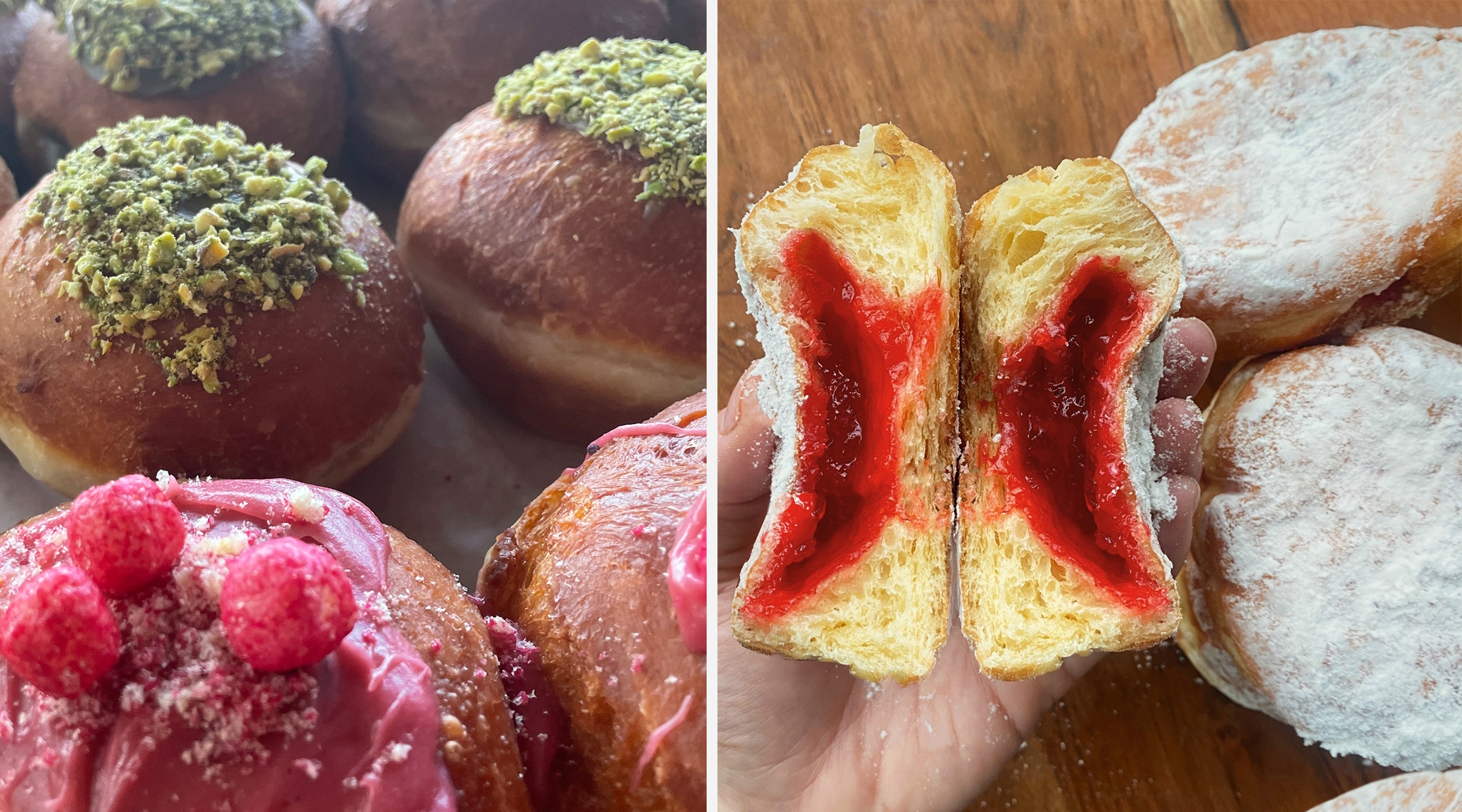
Cafe Motek Bakery (left) is baking inventive sufganiyot like like pistachio and black cherry with red Bamba; the offerings at Orwashers (right), a Manhattan bakery since 1916, leans more traditional. (Courtesy)
Breads Bakery
1294 Third Ave., Upper East Side
18 East 16th St., Union Square
1890 Broadway, Upper West Side
1230 Sixth Ave., Rockefeller Center
Bryant Park kiosk
Israeli-inspired Breads Bakery, perhaps best known for its viral babkas hot out of the oven, is serving a selection of strawberry, chocolate, vanilla and pistachio-filled sufganiyot this Hanukkah. The donuts, $3.95 each, are available at all locations, and are also available for preorder from Dec. 23 until Dec. 31. Get details here.
By The Way Bakery
2440 Broadway, Upper West Side
1236 Lexington Ave., Upper East Side
Helene Godin founded By The Way Bakery 2011 in Hastings-on-Hudson, and later expanded to Manhattan to provide New Yorkers with high-quality dairy-free and gluten-free baked goods. For a healthier holiday option, By the Way’s Hanukkah donuts are baked, not fried, and also on the smaller side. Their self-proclaimed “diminutive” jelly donuts, filled with raspberry jam ($3.75 each or $30 for a box of nine), “are larger than a Dunkin Donuts Munchkin, and smaller than a traditional sufganiyah,” Godin said. They are available by preorder, 24 hours in advance, for in-store pickup, as store quantities can be limited. Visit their website for details. Kosher supervision by OK-Kosher.
Cafe Motek Bakery
176-19 Union Turnpike, Fresh Meadows, Queens
Natanel Shabbat brought all his sufganiyot fillings from Israel for his brand-new bakery tucked inside the Q Kosher Supermarket in Fresh Meadows, Queens. The variety of flavors include Dubai chocolate, black cherry with red Bamba, pistachio ganache, dulce de leche and candy flavors such as Kinder Bueno and Klick, an Israeli chocolate. Prices range from $2.50 for mini donuts to $7.99 for speciality flavors. Preorder by phone at (929) 944-8900. Kosher certification by Vaad Harabonim of Queens.
Claudette’s
190 Beach 69th St., Arverne, Queens
157-02 Cross Bay Blvd., Howard Beach, Queens
108-10 Rockaway Beach, Queens (at Rockaway Hotel Café; donuts available on Saturdays or Sundays)
Specializing in Moroccan-Israeli cuisine in Queens, Claudette’s prides itself on frying its sufganiyot in 100% avocado oil. Their prices range from $5 for a single donut to $45 for a dozen donuts filled with rosewater raspberry jam, halva cream, lemon cardamom, cappuccino or pistachio rose. Only about 50 donuts are made each day during the holiday season; preorders (2 days in advance) suggested. Visit their website for more information.
Doughnut Plant
245 Flatbush Ave., Brooklyn
89 East 42nd St. Midtown
379 Grand St. Lower East Side
3100 47th Ave., Long Island City, Queens
196-198 Bedford Ave., Brooklyn
Doughnut Plant was founded in 1994 by Mark Isreal as a little shop on the Lower East Side, well before the proliferation of over-the-top donuts across the city. For Hanukkah this year the chain is offering blackberry jam-filled sufganiyot topped with marzipan glaze and strawberry jam-filled sufganiyot dipped in vanilla bean glaze, priced at $4.75 each, or boxes of six for $30. It’s also selling a large menorah-shaped donut, with a cream-cheese glaze and blackberry jam, for $55. See their website for more information. Kosher supervision by the International Kosher Council.
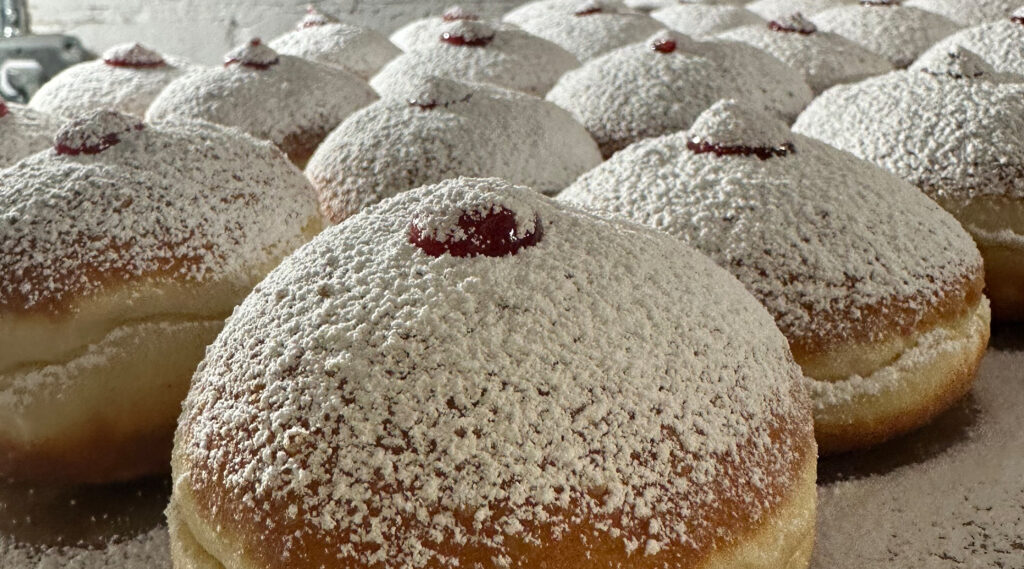
Michaeli Bakery, with locations on the Lower East Side and the Upper East Side, will bake sufganiyot daily throughout the holiday. (Courtesy)
Fan-Fan Doughnuts
448 Lafayette Ave., Bedford-Stuyvesant, Brooklyn
At her Brooklyn donut bakery Fan-Fan, owner/operator Fany Gerson is well known for her creative donuts that draw inspiration from her Jewish and Mexican roots as well as unique flavors from around the world. For Hanukkah this year, she’s offering a holiday box ($27) with half a dozen inventive sufganiyot, including a latke flavor, containing apple butter and topped with sour cream glaze and potato chips; as well as passionfruit meringue, dulce de leche-mocha praline and raspberry cheesecake. She is also accepting orders for traditional sufganiyot filled with strawberry or raspberry jam; $40 a dozen or $22 for a half dozen. Other sampler boxes as well as limited quantities of individual donuts are available in-store ($3.65 to $4.50). Visit Fan-Fan’s website for pre-orders and more information; pickup available at the Brooklyn bakery or in Manhattan at Mijo at Pier 57.
Kith Treats
337 Lafayette St., NoHo
55 Water St., Dumbo, Brooklyn
25 Kent Ave., Williamsburg, Brooklyn
Beginning Dec. 20, this hip apparel brand — which features in-house ice cream parlors known as Kith Treats at many of its locations — will debut a limited-time jelly doughnut ice cream sandwich in collaboration with Doughnut Plant (see above). This Hanukkah treat, featuring a split donut filled with strawberry jam and vanilla ice cream infused with Frosted Flakes, toffee crunch and strawberries, retails for $9 and will be available through Jan. 5.
Kubeh
464 Sixth Ave., Greenwich Village
Chef Melanie Shurka’s Greenwich Village restaurant Kubeh may specialize in the Middle Eastern dumplings of the same name, but during Hanukkah, she’ll also serve sufganiyot as part of Kubeh’s menu from now through the end of holiday. Diners can choose from raspberry jam or Nutella as part of a price-fixed holiday dinner, or order the pair a la carte for $11. Get more information here.
Michaeli Bakery
115A Division St., Lower East Side
401 East 90th St., Upper East Side
After high-profile stints at Tel Aviv’s Lehamim bakery and its New York City spinoff, Breads, babka maestro Adir Michaeli opened his very own bakery on the Lower East Side in 2019. This year, for the Festival of Lights, he’ll be baking a limited amount of sufganiyot daily, filled with strawberry jam, dulce de leche, pistachio, hazelnut, vanilla, chocolate or halva ($4-$5). Advance orders not available. Kosher certification by the International Kosher Council.
Modern Bread & Bagel
472 Columbus Ave., Upper West Side
1427 Third Ave., Upper East Side
After training at Le Cordon Bleu, Orly Gottesman experimented with gluten-free baking and opened the fully gluten-free Modern Bread & Bagel, whose bagels have made many “best of NYC” lists. This Hanukkah, Modern Bread & Bagel are offering sweet, gluten-free brioche sufganiyot in the following flavors: blue and white Boston cream, Samoa cookie, affogato, blueberry pie, cookies and cream, as well as chocolate and raspberry. The chocolate and raspberry flavors are $6.95 each; the others are $7.50. Preorders available; visit their website for more information. Kosher certification by the International Kosher Council.

Like all their offerings, the sufganiyot at Modern Bread & Bagel are gluten-free. (Courtesy)
My Most Favorite Food
37-22 13th St., Long Island City, Queens
This longtime kosher bakery has gone through several iterations since Doris Schechter first opened her own bakery in Great Neck more than 40 years ago, incorporating her culinary memories from Austria-Hungary. This year, the Long Island City bakery is making raspberry or apricot sufganiyot available in full size or mini. Get four full-size donuts for $20 or twelve minis for $39. Preorders required; both pickup and delivery are available. See their website for more information. Kosher supervision by K-ID under Rabbi Don Yoel Levy.
Orwashers
308 East 78th St., Upper East Side
440 Amsterdam Ave., Upper West Side
Orwashers offers traditional sufganiyot with fillings from the Hudson Valley-based Beth’s Farm Kitchen: raspberry, strawberry, sour cherry, chocolate-raspberry, chocolate-sour cherry or chocolate-strawberry. Half a dozen are $27.50; individual filled donuts are $5. To order, visit their website. The preordering deadline is Dec. 23.
Queens Pita
68-38 Main St., Flushing, Queens
Queens Pita, a neighborhood go-to for kosher breads, pita and baked goods in Flushing, offers 15 flavors of sufganiyot this year — including raspberry, vanilla, halva, Oreo, lemon, grape, chocolate, caramel and strawberry mousse — for $3.50 each. Customers can self-select their favorite flavors from large trays that line the tables. Kosher supervision by Vaad Harabonim of Queens and CRC of Brooklyn.
Sesame
5024 13th Ave., Boro Park, Brooklyn
1540 Coney Island Ave., Flatbush, Brooklyn
Known as the sufganiyot supplier to much of the observant Jewish community in Brooklyn, Sesame is offering 17 varieties of sufganiyot this year, including blueberry, lemon meringue, peanut butter, custard, cheese, Swiss chocolate, caramel (dairy or parve), chocolate hazelnut, raspberry and pistachio. Prices range from $2.75 to $5.25 each. Pre-order online will be available for large quantities only; check Sesame’s website for details. Kosher Supervision by CRC.
Taste of Israel
1322 Ave. M, Midwood, Brooklyn
Rafi Shaul makes all of his bakery’s small-batch sufganiyot by hand himself, the old-fashioned way, without any machinery. This year, Taste of Israel is serving halva, caramel, custard, Lotus, jelly, Rosemarie chocolate and cookies & cream donuts (from $4 to $6 each). Preorders suggested; call (347) 554-8133. Kosher supervision by Rabbi Yisroel P. Gornish.
Urban Pops
518 Kings Highway, Brooklyn
Urban Pops, purveyors of inventive dairy-free gelato sold in popsicle form, is now in the donut business. Sophie Cohen opened her Brooklyn shop in 2012, and this Hanukkah she’s creating hot donut sammies: A split donut filled with gelato, in flavors like s’mores donut filled with chocolate gelato, torched marshmallow cream, and crushed graham cracker ($8.25). Customers at the Brooklyn store can choose among flavors that change daily; Urban Pops also delivers in Brooklyn and parts of New Jersey and Long Island, with pre-orders available for pickup in Queens, Rockland County, New Jersey and Long Island. Visit their website for more information. Kosher supervision by OK Parve.
Montreal synagogue firebombed for the 2nd time in just over a year
Assailants firebombed a synagogue in a Montreal suburb for the second time in just over a year, the latest in a series of attacks on Canadian Jewish institutions since Hamas’ Oct. 7, 2023, invasion of Israel.
As in the other recent attacks on Canadian Jewish sites, no one was injured in the incident.
Mordecai Zeitz, the emeritus rabbi at Congregation Beth Tikvah, a modern Orthodox synagogue in the suburb of Dollard-des-Ormeaux, said the congregants met for morning prayers on Wednesday morning outside the synagogue.
“We were able to recite the morning prayers in an abbreviated way,” he said.”We did not close even if we had to go outside to avoid the fires on the inside, but we had the fires of Jewish identity and Jewish pride very much front and center, in front of the charred doors of the synagogue,” Zeitz told the Jewish Telegraphic Agency.
Police told the Montreal Gazette there were no injuries and that witnesses reported seeing a suspect at the site prior to the arrival of police. The building suffered minor smoke damage in addition to its front glass shattering.
Assailants tossed a firebomb at the same synagogue in November 2023 just weeks after Hamas’ invasion, which launched Israel’s multi-front war. There have been a number of similar attacks on Canadian Jewish institutions since then, including shots fired at Jewish schools. In August, bomb threats were sent to dozens of Jewish institutions across Canada.
This week’s attack also comes after a violent pro-Palestinian demonstration in Montreal in late November where protesters burned Israeli Prime Minister Benjamin Netanyahu in effigy. And it comes roughly two weeks after an Australian synagogue was firebombed.
Zeitz said the damage was limited to the shattered glass and to the vestibule, and that he expected services to be held inside on Wednesday evening. The synagogue was inviting non-congregants to attend a solidarity Shabbat service on Saturday morning, he said, noting that the day school attached to the building had stayed open and functioning.
“We are never out of business,” he said.
B’nai B’rith Canada called on the authorities to do more to stem the violence.
“This is a terrifying reminder that Montreal is increasingly unsafe for Jewish people,” the synagogue’s cantor, Henry Topas, said in a statement.
“This is the result of the failure of leaders at all levels to hold accountable those responsible for the hate and violence that is infesting Canadian society,” said Topas, who is also B’nai Brith Canada’s regional director for Quebec and Atlantic Canada. “Specifically, Mayor Valerie Plante must act now to stop the exponential rise in hate and antisemitism which she has permitted to get out of control in Montreal.”
Plante and Canadian Prime Minister Justin Trudeau condemned Wednesday’s attack and vowed to track down the perpetrators.
“This vile antisemitic attack against Montreal’s Jewish community is cowardly and criminal,” Trudeau tweeted. “I trust the perpetrators behind this hateful act will be quickly brought to justice.”
Plante wrote on social media that “antisemitic actions are criminal actions,” adding, “It is intolerable that citizens of Montreal should live in insecurity because of their faith.”
18 notable Jews who died in 2024
As 2024 comes to a close, we look back and mourn the Jewish icons who have left outsized legacies on politics, the arts, sports and everything in between.
In chronological order, here is a selection of obituaries of 18 notable Jews who died in 2024.
Pearl Berg
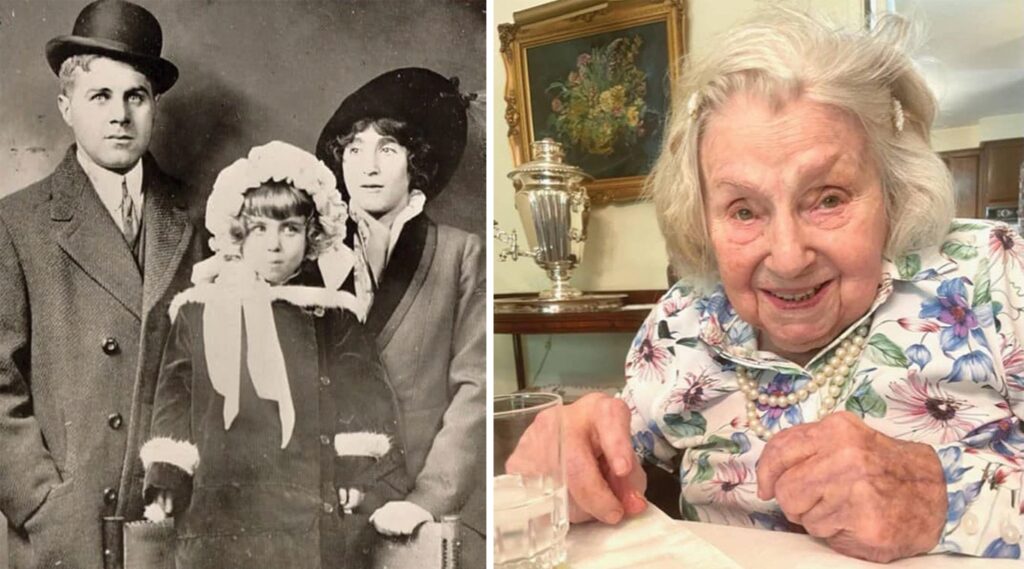
Pearl (aged 3) with her parents Archiebald and Anna (Gerson) Synenberg in 1913; at right, Berg in recent years. (Gerontology Research Group, Gerry Teitelbaum/Judy Taback)
At the time of her death, Pearl Berg was thought to be the oldest Jewish person in the world, and the ninth-oldest overall. A philanthropist active in her local Hadassah chapter, Berg was married for 58 years to Mark Berg, a businessman and investor. He died in 1989. “She maybe had a sip of Sabbath wine but she didn’t drink, she didn’t smoke, she ate sensibly, she had good emotional balance and she clearly had remarkable genes,” Berg’s youngest son, Robert Berg, told the Los Angeles Times. She died on Feb. 1 at 114.
Charlie Biton
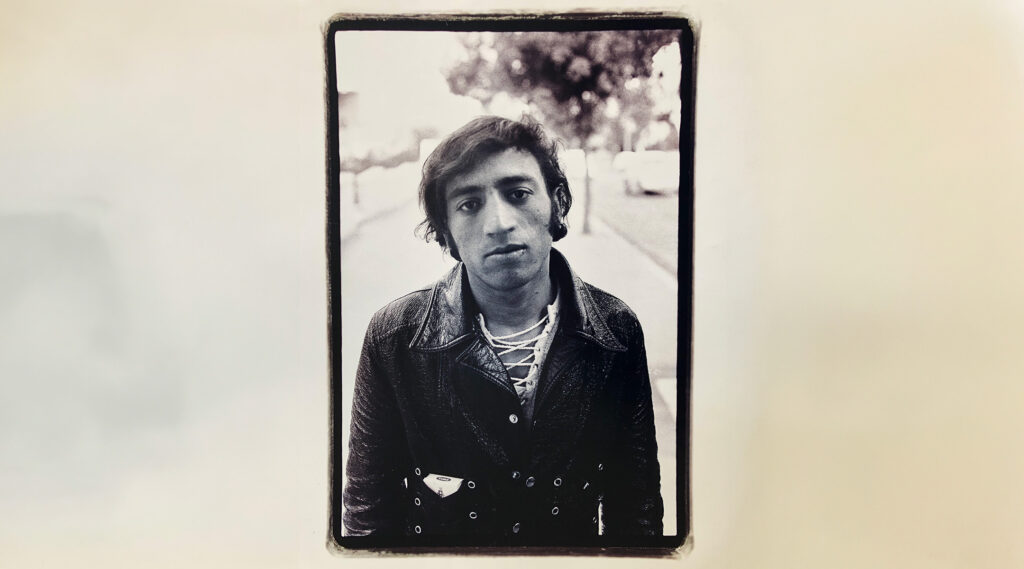
A portrait of Charlie Biton at the start of the Israeli Black Panther movement in 1971. (Courtesy of Meir Wigoder)
In 1971, Charlie Biton co-founded the Israeli Black Panthers, a movement that fought against the racism and poverty experienced by Mizrahi Jews in Israel. That set Biton on a course of activism and politics that would have seemed unlikely for someone with limited schooling and a criminal background. Biton rode the success of his protest group to a 15-year career as a member of Israel’s parliament, serving from 1977 to 1992 mostly alongside communists in the Hadash faction. Biton distinguished himself as a fighter for social change and an early voice for peace with the Palestinians. He died on Feb. 24 at 76.
Richard Lewis
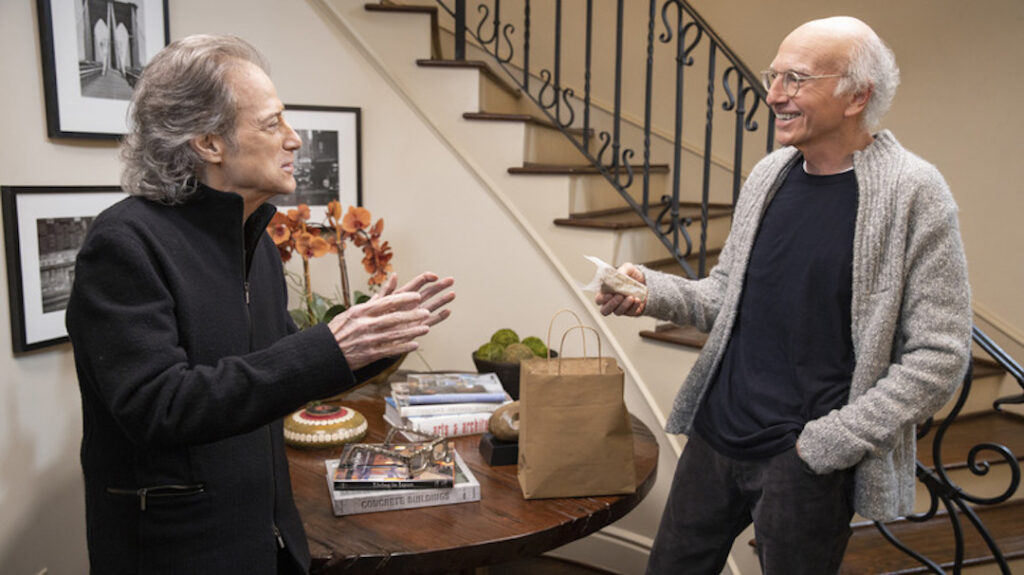
Richard Lewis and Larry David in an episode of “Curb Your Enthusiasm.” (HBO)
Comedian Richard Lewis parlayed his neurotic Jewish personality and self-deprecating humor into a 50-year career as a standup and actor. Most notably, he starred in the ABC sitcom “Anything but Love,” and played a fictionalized version of himself in HBO’s “Curb Your Enthusiasm” from 2000 until 2024. Said Larry David, the show’s creator and Lewis’ close friend, “He had that rare combination of being the funniest person and also the sweetest.” He died on Feb. 27 at 76.
Martin Greenfield
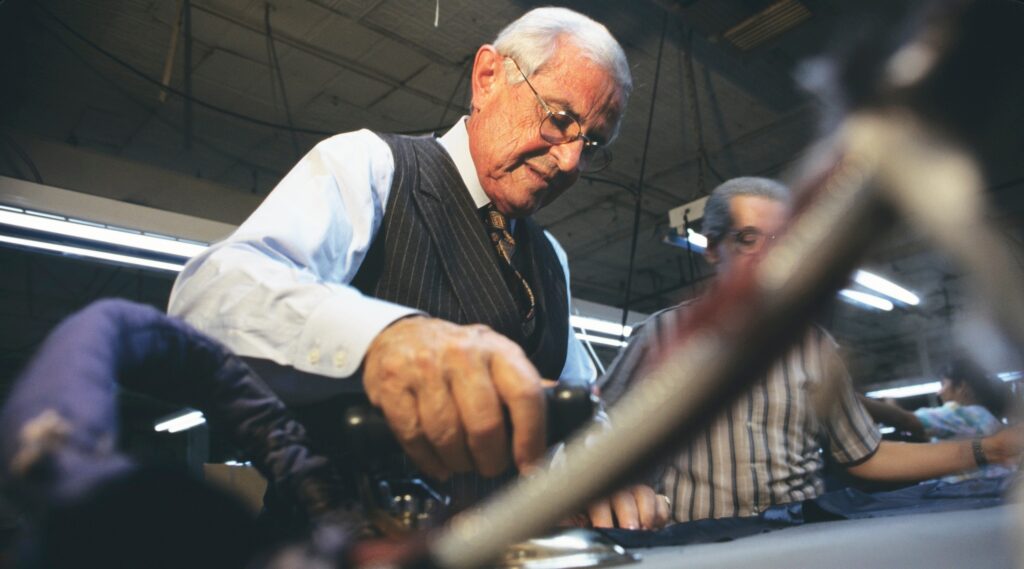
Martin Greenfield, tailor for Bill Clinton and Colin Powell, in his Brooklyn shop. (Photo by mark peterson/Corbis via Getty Images)
Martin Greenfield survived Auschwitz and Buchenwald, where he learned to sew after accidentally tearing a Nazi soldier’s shirt. After immigrating to the United States, he became a master tailor who dressed a series of presidents from Dwight Eisenhower to Barack Obama. Working out of a third-floor office in his East Williamsburg factory, Greenfield became one of the best-known — and some would say best — men’s tailors in the country. “Receiving your first tailoring lesson inside a Nazi concentration camp was hardly the ideal apprenticeship,” Greenfield recalled in his memoir. “I would have much preferred to hone my craft on Savile Row or in the mills of Milan. Looking back, though, that moment in the camps marked the beginning of the rest of my life.” He died on March 20 at 95.
Joe Lieberman
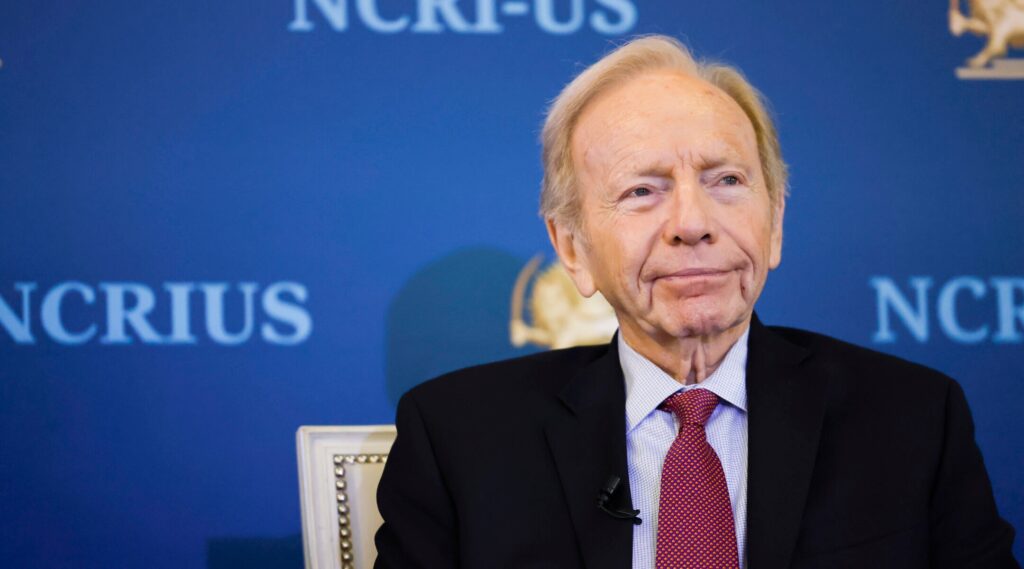
Former Sen. Joe Lieberman (D-CT) speaks at a panel hosted by the National Council of Resistance of Iran – U.S. Representative Office, August 17, 2022 in Washington, DC. (Anna Moneymaker/Getty Images)
Joseph Lieberman served as a senator from Connecticut for 24 years and, as Al Gore’s running mate in 2000, became the first Jew on a major presidential ticket. A moderate — some would say conservative — Democrat turned independent, Lieberman was known for his attempts to build bridges in an increasingly polarized Washington, sometimes losing old friends and allies along the way. Lieberman died on March 27 at 82.
Ken Holtzman

Ken Holtzman pitching for the Chicago Cubs during the 1968 season. (Sporting News via Getty Images)
Ken Holtzman, who played 15 seasons in the major leagues, was the winningest Jewish pitcher in baseball history. The MLB veteran threw two no-hitters, won four World Series rings and made two All-Star teams. A leftie, he played for the Chicago Cubs in two stints; the Oakland Athletics, where he won three consecutive titles from 1972-1974; the Baltimore Orioles; and the New York Yankees, where he won his fourth ring in 1978 despite not appearing in the series. In his retirement, he worked at his hometown Jewish community center. He died on April 15 at 78.
Rabbi Moshe Kotlarsky
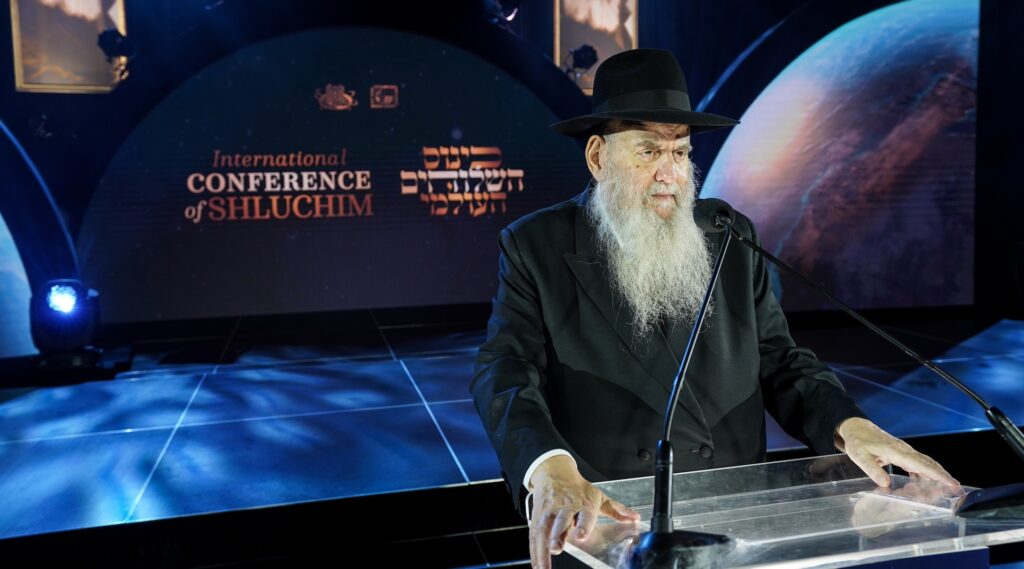
Rabbi Moshe Kotlarsky, then vice chairman of Merkos L’lnyonei Chinuch, the educational arm of the Chabad-Lubavitch movement, addresses attendees on Zoom during the International Conference of Chabad-Lubavitch Emissaries, in Brooklyn, New York, Nov. 15, 2020. (Bentzi Sasson/Chabad.org)
A leading figure in the Chabad-Lubavitch community, Rabbi Moshe Kotlarsky was known for his efforts to build the Hasidic movement’s global outreach efforts and for his personal ties with community members. As chairman of various Chabad affiliates, Kotlarsky played a key role in carrying out the vision of the movement’s late leader, Rabbi Menachem Mendel Schneerson, known as the Rebbe, in launching what are now more than 5,000 outreach centers in more than 100 countries. “He was caring for everybody and that’s why everybody feels so close,” said one rabbi who flew to Brooklyn from Amsterdam for his funeral. Kotlarsky died on June 4 at 74.
Kinky Friedman
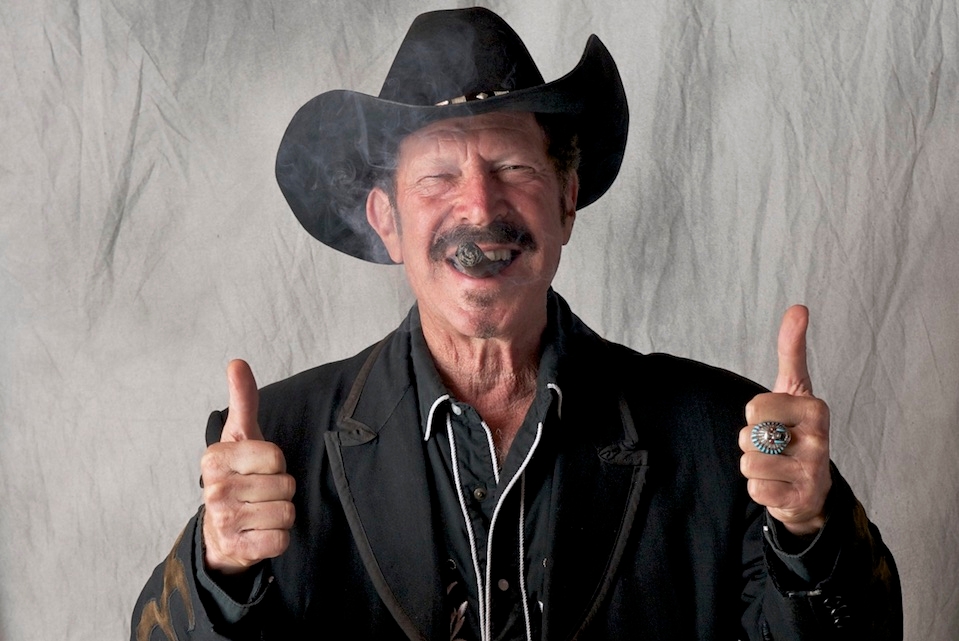
Kinky Friedman styled himself after popular American satirists Will Rogers and Mark Twain. (JTA files)
As a cigar-chomping, mustachioed Texan country singer and mystery novelist, Kinky Friedman’s body of work often seemed like the un-kosher marriage of the Borscht Belt and the Bible Belt. The frontman for the flamboyant 1970s country group Kinky Friedman and the Texas Jewboys, he was notorious for satirical songs such as “They Don’t Make Jews Like Jesus Anymore,” a raucous sendup of racism, while also turning serious with works like the 1973 song “Ride ’em Jewboy,” a haunting elegy on the Holocaust recorded by Willie Nelson and sung in concert by Bob Dylan. Friedman died on June 27 at 79.
Ruth Westheimer
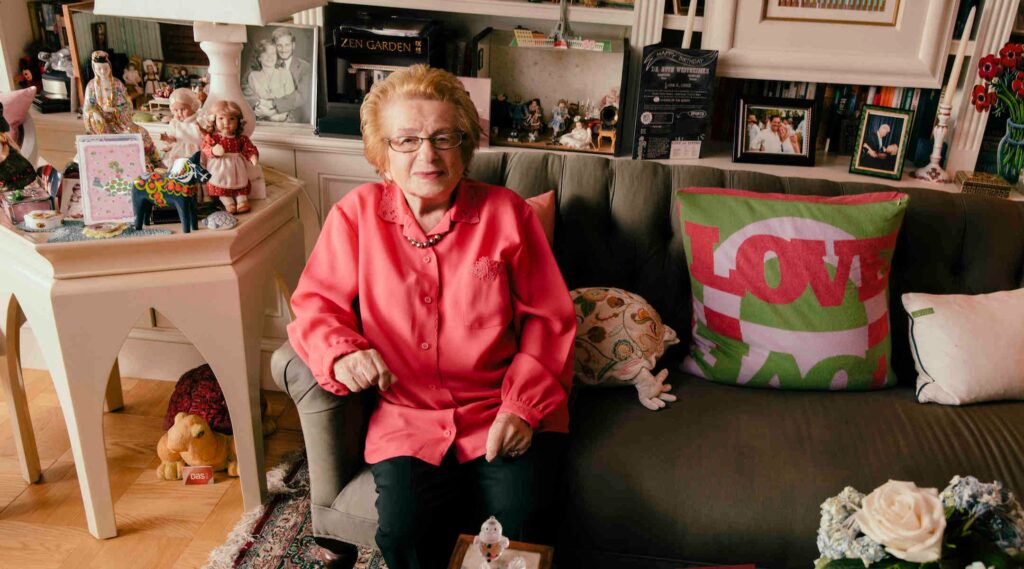
Dr. Ruth Westheimer, a Holocaust survivor who became America’s most famous sex therapist, was featured in the 2019 documentary “Ask Dr. Ruth.” (Austin Hargrave)
A Holocaust survivor and Israeli military veteran, the diminutive Ruth Westheimer charmed and educated millions of listeners as the taboo-breaking radio sex therapist known as “Dr. Ruth.” Her program, “Sexually Speaking,’” which launched in 1980 on the now-defunct WYNY-FM, broke broadcasting taboos around talking about sex and helped make her the most famous sex therapist in the world — albeit one with a motherly demeanor and thick German accent. She was a firm believer in sex as healthy dialogue among consenting partners, and also emphasized psychology over biology. “When it comes to sex, the most important six inches are the ones between the ears,” she once famously said. She died on July 12 at 96.
Queenie Hallegua
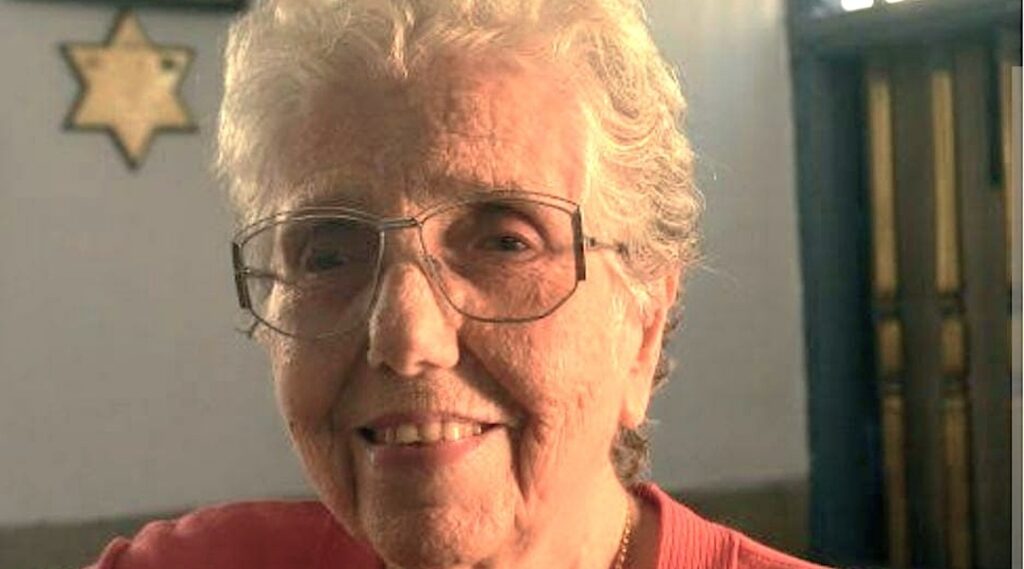
Queenie Hallegua was the warden and managing trustee of the Paradesi Synagogue in Kochi, India — one of the oldest synagogues in the Commonwealth countries. (Photo courtesy Ellen Goldberg)
When a JTA correspondent visited Kochi, India in 2020, a researcher said only two Jews were still living in Jew Town, a once-vibrant community where perhaps 3,000 Jews lived at its peak in the 1950s. The death of Queenie Hallegua, the last of the Paradesi, or “foreign,” Jewish women in Kochi, left her nephew Keith as the last Jew there. Queenie Hallegua was the warden and managing trustee of the Paradesi Synagogue, a 450-year-old landmark, from 2012 to 2018. Queenie and her late husband Sammy hosted Queen Elizabeth and her husband, Prince Philip, when they came to the Paradesi Synagogue in 1997. She died on Aug. 11 at 89.
Silvio Santos

Silvio Santos and his wife, Iris Abravanel, at a ceremony in 2019. (Alan Santos/PR/Wikimedia Commons)
Silvio Santos, a son of Sephardic Jewish immigrants, rose from working-class roots to become one of Brazil’s wealthiest men and a popular television personality. Born in Rio de Janeiro, the former street vendor built a media empire, including SBT, one of Brazil’s top three television networks. Calling him “Brazil’s first-ever celebrity billionaire,” Forbes magazine once compared him to Oprah Winfrey and Steven Spielberg. He died on Aug. 17 at 93.
Hersh Goldberg-Polin
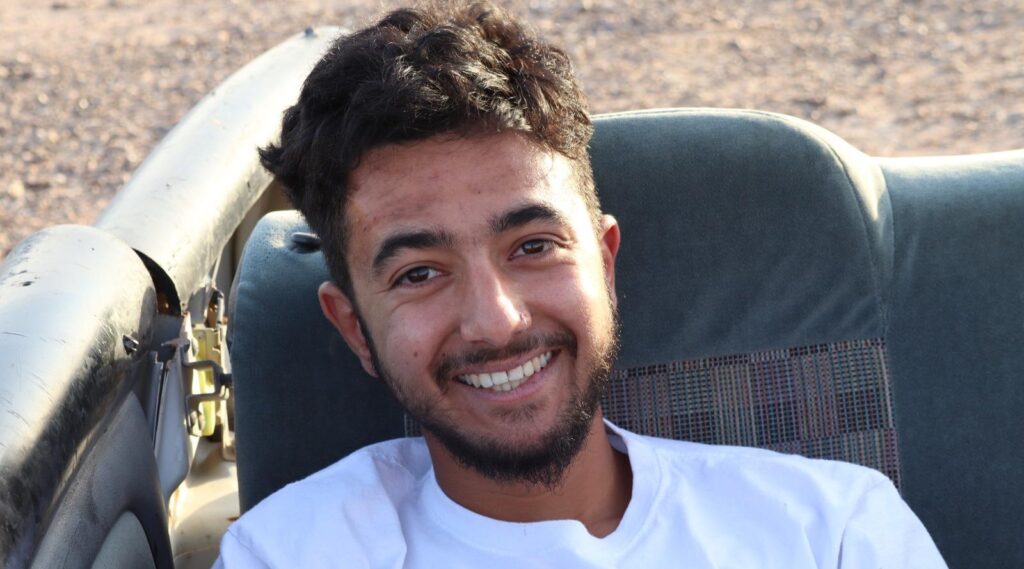
An undated photo of Hersh Goldberg-Polin. (Jon Polin)
Hersh Goldberg-Polin moved with his family to Israel when he was a child and became a symbol of the plight of Israelis held hostage in Gaza after Hamas terrorists abducted him from the Nova music festival on Oct. 7, 2023. His parents, Rachel Goldberg-Polin and Jon Polin, became prominent advocates for bringing the hostages home, sharing frequently and eloquently about their son, whom they described as a wise, inquisitive, kind and gentle soul who was an engine of justice in the family and beyond. He and five other hostages — Eden Yerushalmi, Ori Danino, Almog Sarusi, Alex Lubnov and Carmel Gat — were killed as Israeli troops closed in on the tunnel below Rafah where they had been held; they were 23, 24, 25, 27, 33 and 40 years old when their bodies were recovered on Aug. 31. “I no longer worry about you,” Rachel Goldberg-Polin said at her son’s funeral. “I know you are no longer in danger.”
Mark Podwal
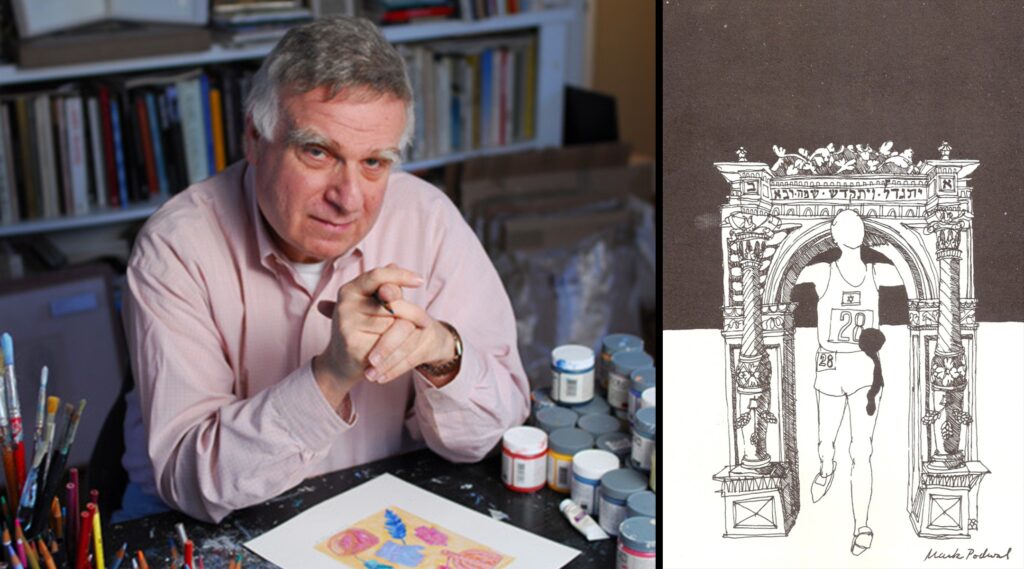
The artist Mark Podwal in his studio in 2007; at right, his illustration “Munich Massacre,” drawn in memory of Israeli athletes killed by Black September terrorists during the Summer Olympics in Munich, was published in the New York Times in 1972. (Wikipedia)
In Mark Podwal’s illustrations — created for children’s books, major newspapers, synagogue tapestries and gallery walls — he devised a Jewish visual vocabulary that made him one of the best known Jewish artists of his era. He also became the only working dermatologist whose works on paper are included in the Metropolitan Museum of Art’s Modern and Contemporary Art Collection. He died on Sept. 13 at 79.
Fania Brantsovsky
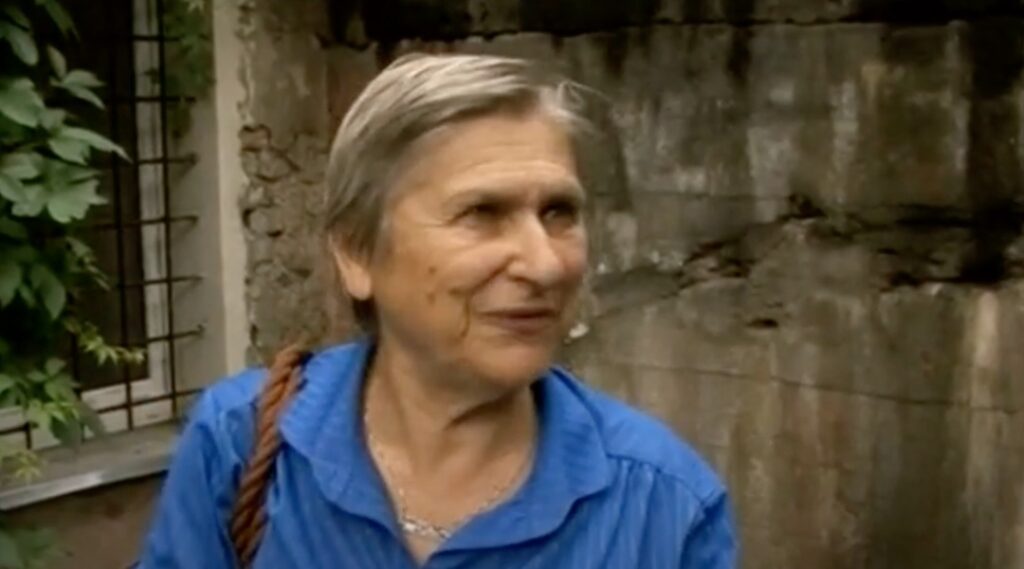
Fania Brantsovsky was one of the last remaining Jewish World War II partisan resistance fighters from the Vilna ghetto. (Video still courtesy Dovid Katz)
Fania Brantsovsky was the last surviving member of the Jewish underground in the Vilna ghetto and a keeper of the flame of the city’s once-glorious Yiddish past. Brantsovsky escaped the ghetto in 1942 and fought against the Nazis and their local collaborators in the Rudninkai forest with a group of Jewish partisans under the command of Abba Kovner. In the years after the war, she became a lifelong advocate for the memory of Lithuanian Jewry and their Yiddish language. She died on Sept. 22 at 102.
Lily Ebert
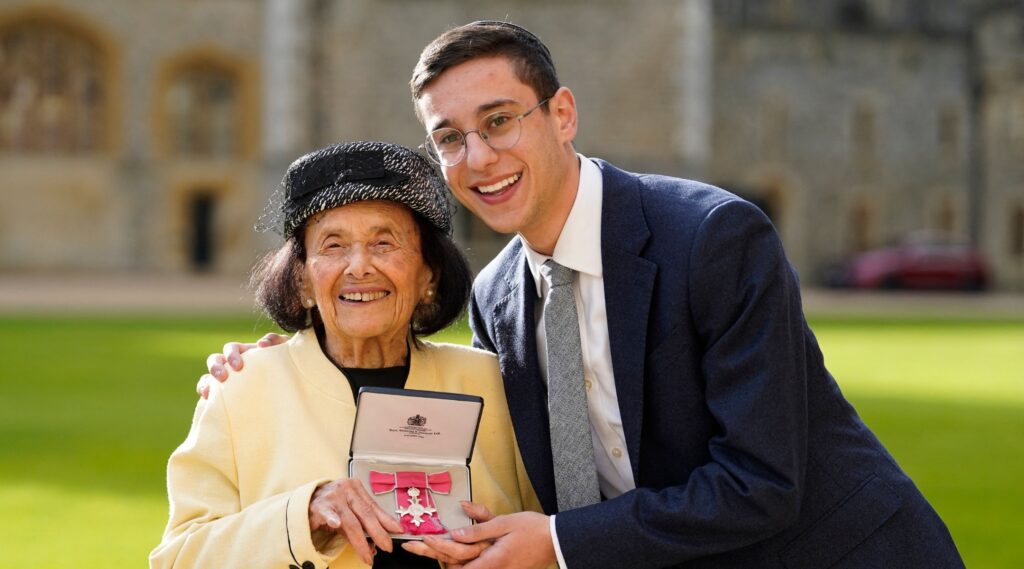
Lily Ebert, left, poses with her great-grandson Dov Forman after a ceremony where she was appointed a Member of the Order of the British Empire. (Andrew Matthews, AFP via Getty Images)
A Hungarian-born Holocaust survivor, Lily Ebert went on to educate millions on TikTok and cultivate a late-in-life friendship with King Charles III. After surviving Auschwitz and living in Switzerland and Israel, Ebert eventually moved to Britain in 1967. She gave testimony at museums and universities and co-wrote a book about her experience with Dov Forman, one of 38 great-grandchildren among her descendants. With Forman, she co-created a TikTok account to educate social media users about the Holocaust and the prevalence of antisemitism. Forman was 16 at the time they created the account in 2021; at the time of her death, it had 2 million followers. Ebert died on Oct. 9 at 100.
Lynda Obst
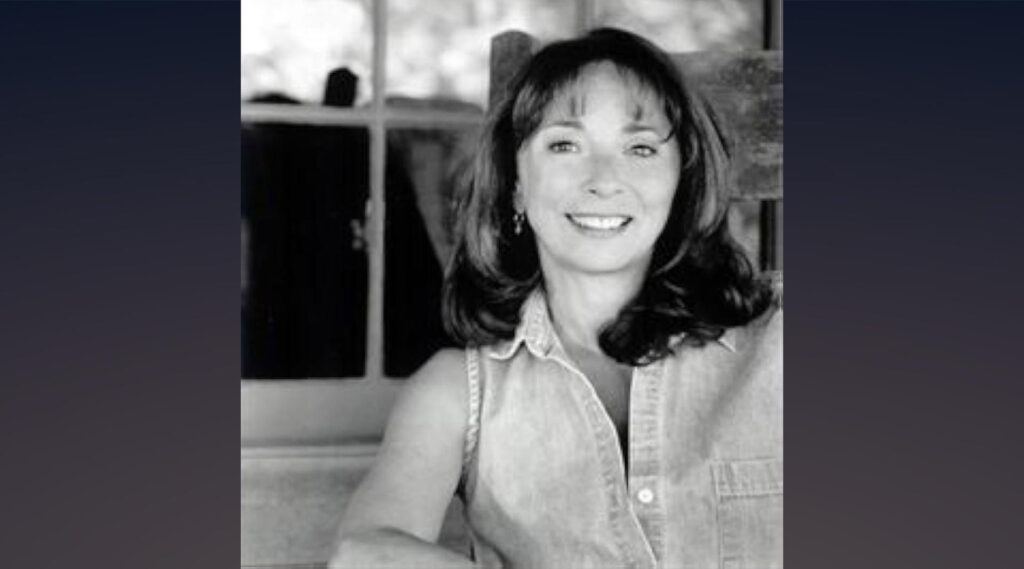
Lynda Obst was the executive producer for her friend Nora Ephron’s romantic comedy “Sleepless in Seattle.” (Via IMDB)
Lynda Obst, a film producer whose credits include “Interstellar,” “How to Lose a Guy in 10 Days,” “Contact,” “One Fine Day” and “Sleepless in Seattle,” was an editor at The New York Times magazine before going to Hollywood in the late 1970s. She produced her friend Nora Ephron’s directorial debut, “This Is My Life” (1992), and was the executive producer for Ephron’s wildly successful romantic comedy “Sleepless in Seattle” in 1993. She became deeply engaged with Judaism while helping her son recover from addiction. She died on Oct. 22 at 74.
Bernie Marcus

Home Depot founder Bernie Marcus poses for a portrait in a Home Depot store on Oct. 15, 1998. (Erik Lesser/Liaison via Getty Images)
Bernie Marcus, the billionaire who co-founded Home Depot, became a Republican megadonor and supporter of civic and political causes in the United States and Israel. Marcus’ legacy includes the transformation of downtown Atlanta with the establishment of the Georgia Aquarium; a massive advance in autism awareness and research thanks to the Marcus Autism Center, also in Atlanta; and the founding of the Israel Democracy Institute in Jerusalem, an important think tank focused on governance. In his final years, he directed his energies toward combating antisemitism on college campuses. He died on Nov. 4 at 95.
Felice Gaer
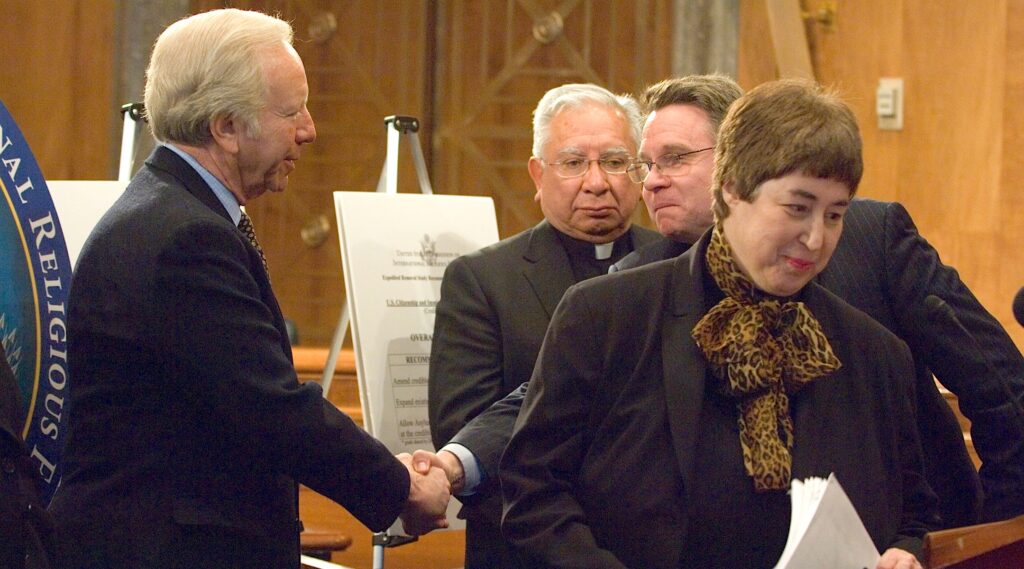
Felice Gaer, at right, then chair of the U.S. Commission on International Religious Freedom, takes part in a news conference presenting its report card on the two-year-old “Report on Asylum Seekers in Expedited Removal,” Feb. 7, 2007. At left, Sen. Joseph Lieberman (D-Conn.) shakes hands with Rep. Chris Smith (R-N.J.) as Bishop Ricardo Ramirez, commissioner of the USCIRF, looks on. (Douglas Graham/Roll Call/Getty Images)
For over 30 years, Felice Gaer Baran directed the American Jewish Committee’s Jacob Blaustein Institute for the Advancement of Human Rights, assuring Jews a seat at the table in global debates around torture, political repression, LGBT rights and antisemitism. As head of the only human rights division within a major Jewish organization, Gaer (who used her maiden name professionally) witnessed gratifying success in advocating for women’s rights, torture victims and the protection of political dissidents around the world. She died on Nov. 9 at 78.
Hanukkah’s arrival on Christmas Day renews ‘Chrismukkah’ deliberations for interfaith families
When Sarah Levitin first visited her now-husband’s Catholic family for Christmas, she was not expecting to see a menorah in their home.
It was 2016, and the first night of Hanukkah fell on Christmas Eve. Levitin, who grew up attending Jewish day school and traveled to Israel on a Birthright trip, had not planned to light Hanukkah candles when she joined her boyfriend’s Sicilian and Polish family for Christmas. But because his family made an effort to include her traditions, she did.
“I was so incredibly moved by that,” Levitin, 32, recalled in an interview. “Even that gesture, in and of itself, for me, was an indicator that we could make this work, and that interfaith is possible, and that there’s a way to blend and make it our own.”
Eight years later, the holiday convergence many call “Chrismukkah” has returned, as the first night of Hanukkah falls this year on Dec. 25, Christmas Day. For interfaith families, the overlap presents a renewed opportunity to combine holiday traditions, or to create new ones, while also bringing into high relief the tensions that can accompany navigating multiple religions.
For Laurie Beijen and her family, that tradition has been to take a trip during their children’s Christmas vacation — and to avoid the holidays altogether.
Beijen, 50, is a San Francisco native who grew up agnostic and married Ben, a Jew from North Carolina. When they started dating almost 25 years ago, the couple experienced a dilemma common in interfaith relationships — as Beijen put it, “the age-old debate: to tree or not to tree.”
“When we started dating, it was puzzling to me that he had such a reaction against Christmas, because for me, it was not religious,” Beijen said. “It was secular. The tree smells good. You get to bring a tree inside your house once a year. What’s the problem with that?”
Beijen said she tried several different approaches. She got a small tabletop rosemary tree. She decorated the fireplace with green garlands. But none of her solutions were acceptable to her Jewish husband.
Then one year, when Beijen was in a store that was playing Christmas music on repeat, she realized she was also growing bothered by the holiday’s accoutrements. Something clicked.
“When I found myself kind of adopting his grumpiness, for lack of a better word, I feel like that was a watershed moment in our relationship and understanding, you want your home to be a safe space,” she said. “And so if that was infringing on his comfort and mood, it wasn’t really worth me trying to bring in whatever mimicked a Christmas tree.”
Now, Beijen’s family has their own holiday tradition: they get out of town. The family goes skiing in Utah, and then travels somewhere warm — this year, to Cozumel. But even their religion-free custom has a holiday component: the family they travel with, while not Jewish, always requests that Beijen bring latke batter to fry together in Utah.
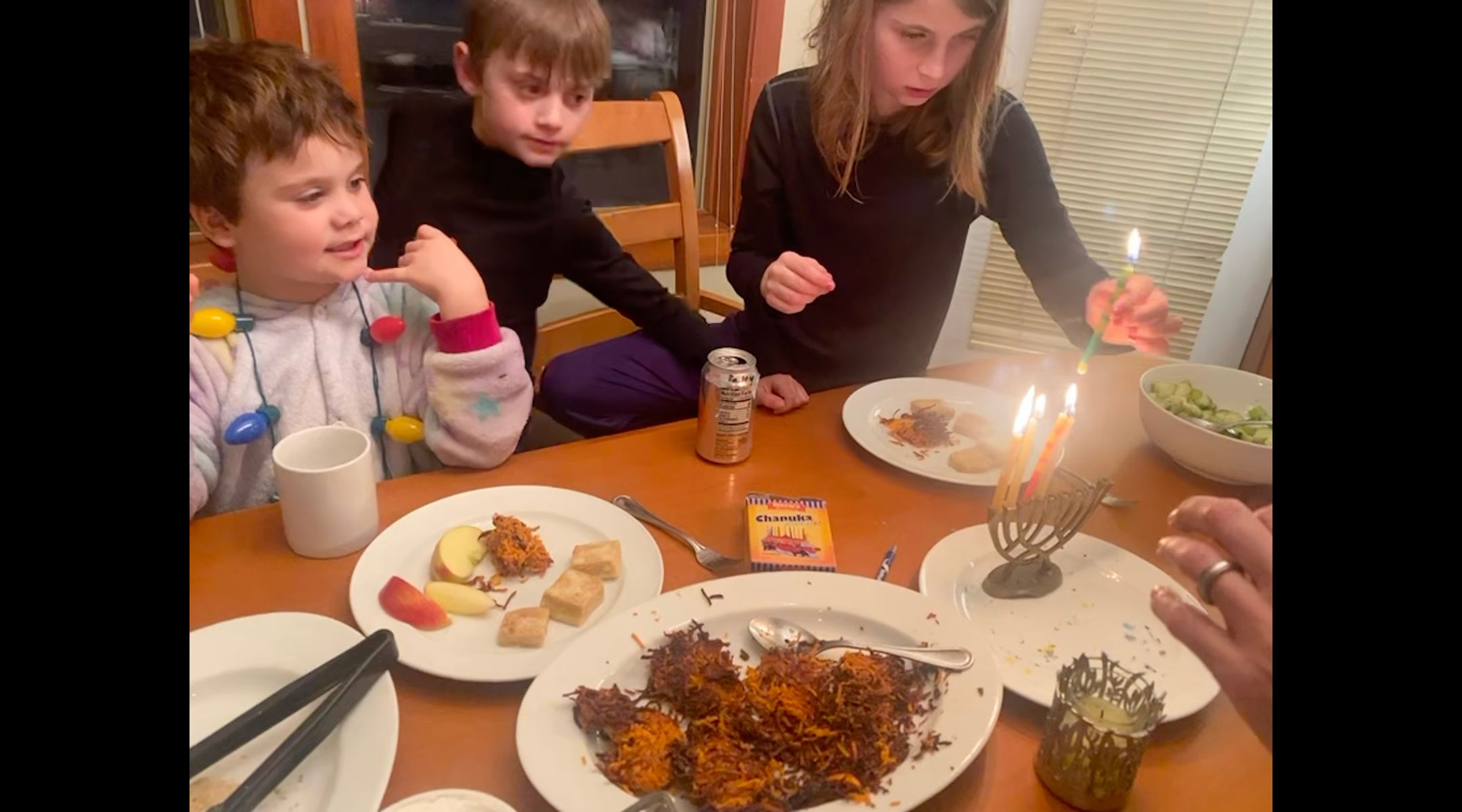
L-R: Alden Van Dam, Jacob Tulchin and Bailey Tulchin celebrating Hanukkah in Utah in 2019. (Courtesy of Laurie Beijen)
Beijen converted to Judaism in 2015, a decade into their marriage. She said she felt drawn to making official how she had already been living for many years — her children attend Jewish day school, and the family is active at their synagogue. But even after she converted, Beijen said, she still feels like they’re an interfaith family.
“I still feel like we have kind of ‘interfaith issues,’ because of my extended family and because I didn’t grow up Jewish,” Beijen said. “I don’t have the experiences of a lot of people, when you play Jewish geography when you first meet somebody. I didn’t go to camp. I didn’t have the youth group experiences.”
Adam Pollack, the chief program officer of 18Doors, a Jewish nonprofit that supports interfaith couples and families, said his organization tends to field more questions from families when the winter holidays are closer together. And it’s not just new couples who seek consultation, he said, but also new parents, couples who want to reimagine their holiday traditions years into a relationship and many grandparents.
“The way that we generally talk about the holidays with those who come to us is that this is an opportunity,” Pollack said. “That it can seem like a challenge to think about how to honor and respect multiple identities and backgrounds, but actually there’s a richness to it, and there’s no one way to do it.”
Pollack added that navigating the holiday overlap is about more than balancing celebrations. It’s also about family dynamics — which he said have become more complicated since Oct. 7, 2023.
“The effects of Oct. 7 and the war and the rise of antisemitism plays out in interfaith families differently than it might in Jewish-Jewish families,” he said. “There are also elements of, ‘How do I see that person in my family who posted these things online? I know I’m going to see them, help me think that through.’”
18Doors offers a number of online resources to help families navigate the holiday season, like a Hanukkah gift guide that features classics of the holiday — like Hanukkah pajamas and kid-friendly menorahs — as well as offerings for interfaith families, like a “Jewdolph” the reindeer Christmas tree ornament.
Rabbi Nolan Lebovitz, whose Valley Beth Shalom Conservative synagogue in Los Angeles oversees dozens of conversions each year, takes a different approach.
When Lebovitz counsels interfaith families on how to navigate the holidays, he urges them to honor their family obligations surrounding Christmas — but to keep their Hanukkah observance separate.
“I often encourage them to create a Jewish space of the Hanukkah menorah and latkes and all of that traditional space at home, before going out to the in-laws to celebrate their tradition of a tree and the story of faith that’s involved in Christmas,” he said. “I think that Judaism always has a discomfort in the mixing of two different categories, whether they be meat and milk, or whether they be holidays of two different faith traditions.”
In other words, Lebovitz said, “I don’t think that Chrismukkah is the right approach, even though it has marketing appeal.”
To some families, however, the ritual objects associated with each holiday present the perfect opportunity to blend traditions. Anthony Witte — who befriended Beijen at a JCC class for interfaith couples in San Francisco — for example, decorates his family’s Christmas tree with a Star of David.
Witte, 57, grew up in an interfaith family and now has one of his own. He said that while he didn’t have a bar mitzvah, he still feels connected to his Jewish background, which he wanted to pass on to his son.
“When our son was born, or before, we agreed that because Judaism meant more to me than Protestantism meant to my partner, that we could raise the kid Jewish,” Witte said. “So that sort of became my task, my mission impossible, to learn what I could.”
Witte’s family celebrates both Hanukkah and Christmas. He recalled a saying from a previous JCC class, posed to a Jewish spouse who was uncomfortable celebrating Christmas: “So you’re okay with having a Christian in the house, but not a tree?”
“To me, it sort of crystallized — absolutely, I’m taking this person and their traditions, and that’s what interfaith is,” Witte said. “Can’t have one without the other. So not only am I okay with it, but I support it, and that’s really our story now. We do the whole thing. We do the Christmas tree, and we do lights. We do a menorah, we have latkes and anything else that we can find.”

At left, Anthony Witte’s Christmas tree, which features a Star of David topper. At right, Sarah Levitin’s New Year’s tree. (Courtesy)
Each year, Levitin decorates the mantle in her living room, turning it into a seasonal display with elements from both Hanukkah and Christmas. This year, that includes signs that read “Merry Chrismukkah” and “Deck the halls with matzo balls,” alongside small Christmas trees and other Hanukkah decor.
In a nod to her family’s roots in the former Soviet Union, Levitin also decorates a New Year’s tree — part of a celebration called Novy God — which looks similar to a Christmas tree, but in Levitin’s home is decorated with blue, white and silver ornaments and a Ukrainian topper.
“That, in and of itself, is a blend,” Levitin said. “Yes, Dan gets a tree, but we’re able to adorn it with things that are important to me from my heritage, and we’re going to try and make it more of a cultural secular tree, rather than a Santa and Christmas tree.”
Levitin said she and her husband have experienced an evolution of sorts in their approach to Christmas. For years, as they celebrated Christmas with Dan’s family, she said she would subconsciously downplay the classic Jewish approach to the holiday: eating Chinese food and watching a movie.
“In my head, it wasn’t really our holiday, even though we had our traditions, because it was his holiday, and his family went to mass, and I really wanted to honor that,” Levitin said.
But that all changed last year, when Levitin was pregnant and they decided not to travel for the holiday. Instead, Dan drove into Brookline, a heavily Jewish Boston suburb near where they live, to pick up Chinese food.
“He was like, I’ve never seen so many people out, and I’ve never seen a restaurant so populated on Christmas,” Levitin said. “That’s when he realized that, OK, you and your family might not celebrate Christmas, but you have traditions too, and we’ve been ignoring your traditions for six years, and it’s time to start reincorporating your traditions too, even though it might not be the religious meaning of Christmas.”
Then, another surprise: their daughter Esther was born on Christmas Day, four weeks early.
“It really puts into perspective the prioritization of what’s important for my core values,” Levitin said. “Above all else, I see my daughter’s birthday before I see the holidays, regardless of how much Dan went to church and went to mass and went to CCD [a Catholic education program], regardless of how in touch I have been with my Jewish faith, culturally, religiously, what have you. Our daughter is the most important thing.”
Levitin said this year, she and Dan are celebrating Christmas Eve with his family, and then will celebrate Esther’s first birthday — starting with a latke breakfast. She said having her daughter’s birthday as part of the holiday considerations will force them to be flexible.
“It might not be a full 50-50 every single year of what we do,” Levitin said. “There might be some years that we emphasize Christmas more. There might be some years that we emphasize Hanukkah more. There might be some years that we emphasize her birthday more. And that’s all OK.”
Mayor Eric Adams calls himself ‘a modern-day Maccabee’ at pre-Hanukkah party at Gracie Mansion
Hundreds of Jewish New Yorkers gathered amid beautifully decorated Christmas trees at Gracie Mansion, Mayor Eric Adams’ residence, for a pre-Hanukkah celebration feting several local Jews and charities.
In prepared remarks, the new Jewish commissioner of the NYPD, Jessica Tisch — whose introduction was met with applause by the packed room — referenced the Hanukkah story, calling Adams — who earlier that day lost a bid to reduce the number of charges he faces as part of a federal corruption indictment — “a light in our community.”
Those receiving awards, honors and citations included Lizzy Savetsky, an Orthodox Jewish influencer in Manhattan known for her pro-Israel content, and four Jewish college students from across the city recognized for their work fighting antisemitism and amplifying Jewish pride on their campuses — Tali Dardashti from New York University, Danielle Babaev from Queens College, Maya Gavriel from Baruch College and Noam Woldenberg from Columbia University.
Guests — including actor and pro-Israel influencer Zach Sage Fox, CEO of UJA-Federation Eric Goldstein and Israeli Consul General in New York Ofir Akunis — circulated from room to room, with many opting to enjoy the unseasonably warm December temperatures on the patio. Richie Taylor, the barrier-breaking Orthodox NYPD deputy chief, was among many uniformed police offers at the event.
On the menu? A smorgasbord of Hanukkah fare and kosher bites which, several signs noted, came courtesy of the Mendy’s outpost at the Jewish Children’s Museum. The spread included latkes with applesauce and sufganiyot, beef lo mein, and chicken shawarma. The wines were Israeli, and assorted flavors of seltzer were also on offer.
A mayoral Hanukkah party is an annual tradition that dates back to Michael Bloomberg’s administration — he put on swanky affairs typically held at the Museum of Jewish Heritage. But Bloomberg was hardly the first New York City mayor to celebrate the Festival of Lights: During David Dinkins’ administration in the early 1990s, there was a menorah lighting ceremony that took place on the steps of City Hall with a cantor, a rabbi, and students from a Jewish school singing together.
In his brief remarks to the crowded ballroom — where many guests shushed their talkative neighbors in order to hear above the din — Adams recalled his visits to Krakow and Rome’s Jewish ghetto. Saying that hatred cannot simply be willed away, he said that as mayor of the city with the largest population of Jews, he and his administration are going “to do [their] part” to fight antisemitism.
“We’re committed to rid our city of any form of hate, antisemitism, hate against Sikhs, hate against African Americans, Islamophobia — hate against any other group,” Adams said.
“We will stand tall together,” he continued. “I want to be extremely clear on this Hanukkah: Eric Leroy Adams is a modern-day Maccabee.”
Other honorees of the evening included Rabbi Boruch Ber Bender from the Achiezer Community Resource Center, which deals with crisis management; Achim B’Yachad, which provides the services of Chai Lifeline for Hasidic families dealing with serious illness or loss; and Chazaq, which seeks to provide Jewish education to Jews of all ages.
Salvador Dali’s little-known series about the founding of Israel comes to a Holocaust museum on Long Island
Salvador Dalí may be best known for his surrealist masterpieces like “The Persistence of Memory” and “The Elephants.” But the Spanish artist also created a suite of paintings to commemorate the 25th anniversary of the founding of the State of Israel.
Now, “Aliyah, the Rebirth of Israel” can be seen in a new exhibit at a Holocaust museum on Long Island.
The Holocaust Memorial Tolerance Center in Glen Cove is showcasing a rare, complete collection of 25 lithographs made from Dalí’s “Aliyah Suite,” commissioned in 1966 by arts book publisher Samuel Shore in New York.
“It’s a complete set, which is quite rare right now, because very often these are broken up and sold individually,” said Jolanta Zamecka, vice chair of the board of directors of the Holocaust Memorial Tolerance Center. “So we are really very lucky.”
The iconic painter created “Aliyah Suite” using gouache, watercolors and India ink on paper; the mixed-media paintings were then reproduced and published in a limited edition of 250 sets of 25 lithographs.
The paintings depict people and events that span thousands of years of Jewish history, from the biblical period of the Land of Israel through the Yishuv period, the Holocaust and the establishment of the State of Israel in 1948. They reference biblical events such as the creation story and the destruction of the temples in Jerusalem, and the series also references mid-century historical events including the sailing of the Eliyahu Golomb — a ship named for one of the founders of the Haganah Zionist paramilitary force during the British Mandate for Palestine — which served as a rescue vessel for Holocaust survivors from Europe.
Perhaps not surprisingly, Dalí took some artistic liberties in his paintings. In his rendering of the Eliyahu Golomb, for example, the ship sinks. In reality, however, after a high-profile hunger strike protesting the British government’s limits on immigration to Palestine, more than 1,000 refugee passengers successfully boarded one of the two ships from Italy and set sail in May 1946.
In another image referencing the biblical quote about making the desert into “a pool of water,” Dalí illustrates the National Water Carrier of Israel, which transfers fresh water from the Kinneret throughout the rest of the country.
Other pieces depict a circumcision, a group dancing the hora around a seven-branch menorah, and various images portraying the Holocaust, including victims behind barbed wire.
The series of paintings made their debut at the former Gallery of Modern Art at Columbus Circle in New York City on April 1, 1968.
In his introductory letter to the painting portfolio, David Ben-Gurion, the first prime minister of Israel, wrote, “The distinguished artist Salvador Dali succeeded through the power of his artistry in embodying in a number of prints the marvel of aliyah, which in a short time fashioned a renewed people, a renewed country, and a renewed — as well as — renewing — state.”
A painting of Ben-Gurion reading the Declaration of Independence, too, was included in the series. (In 1968, Dalí painted Ben-Gurion again in a collection titled “Famous Men,” as well as Moshe Dayan, the Israeli minister of defense, recognizable for his eyepatch.)
This particular suite of lithographs was previously in the hands of the Nassau County Museum of Art. It was sold at auction for $31,505 to private collectors in 2021 during the height of the COVID-19 pandemic and is currently on loan to the Holocaust Memorial Tolerance Center.
“To us, what is important here at the Holocaust Center is that this becomes really a very crucial time when the need for historical truth is more important than ever,” Zamecka said. “This is the rebirth of Israel, especially regarding the Jewish exile in return of the Jews to their homeland. And so by highlighting the rebirth, this exhibit bridges the past to the present, and it’s grounding us in the enduring relevance of these pivotal events.”
The Jewish leader taking on Christian nationalism
For decades, Americans United for Separation of Church and State called its adversaries “religious extremists.” Today, the group has a more specific target: fighting Christian nationalism.
The decision to sharpen the language was made by Rachel Laser, the group’s president for the last six years. A Jew and the first religious minority to lead Americans United since its founding in 1947, Laser wanted the group to be more clear-eyed about what she sees as a growing threat to religious pluralism in the United States: the belief that American laws should favor Christian values over those of other religions.
But it was not an easy decision for her to make. “On some deep level, I worry about alienating Christians, as many Jews do,” Laser wrote last year in the group’s magazine. “When you are part of a mere 2% of the population, it can feel perilous to risk fostering adversity with 65% of the population.”
That anxiety about the optics of her leadership surfaced even before she took the job. During her interview, Laser recounted to the Jewish Telegraphic Agency, she asked the board outright: “Why aren’t you hiring Christian clergy?”
Americans United had always been led by pastors, but Barry Lynn, who served as the organization’s previous leader, from 1992 to 2018, said he welcomes a departure. If there were any concerns about having a Jew lead a fight against Christian nationalism, Laser has proven it’s possible to do so, he said.
“I’ve thought about that a lot, but I just don’t think it’s a burden or a problem because she works very collaboratively with board members who are themselves Christians and she works in coalitions,” Lynn said. “She understands the depths of the danger that Christian nationalism presents to both Christianity and to religious minorities.”
Laser, 55, is married to intellectual property lawyer Mark Davies. They have three children and the family belongs to Adas Israel, a Conservative congregation in Washington, D.C. She began her journey in Chicago, where she grew up with Jewish activist parents who didn’t prioritize religious life. But when she followed a friend to Sunday school, she encountered Rabbi Arnold Jacob Wolf, a progressive Reform Jewish leader who was deeply involved in civil rights and other social justice causes.
“I was a very curious kid, and he encouraged me to ask questions,” Laser said, fighting back tears as she recalled Wolf, who passed away in 2008. “The more questions I asked, the more he appreciated me. That’s why I value being Jewish.”
Laser (her name is pronounced LAZZ-er) carried those values into a career focused on public service. After earning a law degree, she held senior roles in organizations advocating for reproductive rights, LGBTQ equality, and interfaith dialogue, including as the deputy director of the Religious Action Center, the advocacy arm of Reform Judaism.
“She’s a knowledgeable Jew who cares deeply about Jewish concerns,” said Rabbi David Saperstein, who led the Religious Action Center during Laser’s time there. “She fit very comfortably into the Reform movement’s view that social justice was a central part of what it means to be a Jew.”
He said he hired her because she was already a proven bridge builder, and it was important for the organization to work across political and ideological lines in Washington. It’s a skill that would be critical when Americans United tapped her in 2018, tasking her with adapting the group for a polarized era.
She took the helm during the second year of Donald Trump’s first presidency, as debates over religion in public life were intensifying. Laser commissioned research to gauge public attitudes and test Americans United’s messaging.
The results were mixed. “Religious extremism” resonated with most audiences, but “Christian nationalism” was less familiar — and even sounded positive to some people. “We didn’t want people to think we were insulting Christianity or patriotism,” Laser said, so she decided against emphasizing the term.
Then came the January 6, 2021, assault on the U.S. Capitol.
Laser saw the insurrection as a wake-up call. In the rioters’ biblical rhetoric and religious rituals, she recognized Christian nationalism as a potent and underappreciated threat. She soon hired Andrew Seidel, a prominent critic of Christian nationalism. On his first day as the new vice president of strategic communications at Americans United, Seidel testified before Congress about the role of Christian nationalism in the Capitol insurrection.
Americans United began using the term regularly, aiming to educate the public while highlighting church-state separation as a critical countermeasure.
“The antidote to Christian nationalism is church-state separation,” Laser said in an interview. “It’s the kryptonite that prevents Christian nationalists from codifying their views into our laws.”
Under Laser’s leadership, Americans United has taken high-profile legal actions, such as suing Oklahoma over its proposed religious charter school and representing a Tennessee Jewish couple rejected by an adoption agency due to their faith. The group also helped raise awareness earlier this year about Project 2025, a detailed conservative proposal for Trump’s second term from the Heritage Foundation.
Donors have responded to these efforts. In 2023, the organization reported $17.9 million in revenue — almost triple what it was raising before Laser took over.
But Laser’s tenure hasn’t been without controversy. The organization’s employee union and some former board members have accused her of fostering a toxic work environment and prioritizing publicity over policy and legal work. After commissioning an outside investigation of the organization’s work culture, the board said Laser has its full support.
Laser’s efforts to counter Christian nationalism reflect broader tensions in American society. While religious affiliation is declining, Trump’s political alliance with the Christian right has energized a vocal minority.
“I love you, Christians,” he said on the campaign trail. “In four years, you don’t have to vote again, we’ll have it fixed so good you’re not going to have to vote.” And the vast majority of them did vote for him.
Since the election, Trump has put together for his next administration a slate of deputies that reflects his strong political alliance with the Christian right, from his nominee for White House budget director Russell Vought to his preferred candidate for defense secretary, Pete Hesgeth.
But while giving Republicans a resounding victory, American voters also rejected many of the specific policies promoted by conservative Christians. In seven states, including four won by Trump, voters approved measures to protect abortion rights. All three state proposals to allow public funding to flow to private and religious schools were defeated. Laser calls these outcomes a rejection of Christian nationalism and a continued endorsement of the principle of church-state separation.
In saying that a solid majority of Americans agree with her worldview, Laser relies on surveys like those from the Public Religion Research Institute. “We find that by a margin of about two to one, most Americans reject Christian nationalism,” said PRRI’s president, Robert Jones.
He said he’s confident in the results because the statements the surveys test against are ”fairly unambiguous.”
“They’re things like, ‘U.S. law should be based on the Bible,’ ‘To be truly American, you must be Christian’ and ‘Christians should take dominion over all areas of American society,’” he said.
As the term “Christian nationalism” has come into play in recent years, Jones’ group has been studying how people respond not only to the underlying attitudes, but also to the term itself.
“We are finding people who qualify as Christian nationalists based on our criteria have a positive view of the term, and people who are rejecting that worldview have a negative view of the term,” Jones said. “So it’s not just a term used by one side to smear the other.”
The phenomena can be seen in the strong sales of a 2022 book called “The Case for Christian Nationalism,” by conservative political theorist Stephen Wolfe, and in prominent politicians, like U.S. Rep. Marjorie Taylor Greene and Sen. Josh Hawley, who have embraced the moniker.
But even as one term has become more common, the question of what language to use is far from settled. Advocates on either side of the debate over the place of religion in public life make various choices for strategic or other reasons.
Sorting through the rhetoric has required substantial attention from Ruth Braunstein, a professor of sociology at the University of Connecticut. That’s because earlier this year, she was awarded a grant from the Henry Luce Foundation to map out the individuals and groups fighting Christian nationalism.
Many of the 100 groups added to the list so far don’t use the term Christian nationalism.
“Some, for example, talk about defending or promoting pluralistic democracy,” Braunstein said. “Others talk about creating a more inclusive vision of American identity.”
A growing bunch, including Americans United, do. And for Braunstein, it was easy to figure out how Laser’s group fit into her project.
“They have a high profile, historical gravitas and respect, and the resources to be able to provide support to other organizations,” she said. “So I think of them as an important node in this broad network.”
A few weeks ago, Laser went on CNN to be briefly interviewed about her opposition to plans in Oklahoma and Texas to bring Christianity into the classroom. She didn’t mention anything about her identity. She simply delivered Americans United talking points: Parents, not politicians, should decide when and if children are exposed to religion; state mandates sully rather than enhance religion; mixing church and state goes against the country’s founding ideals.
But one viewer who contacted CNN to complain about Laser’s statements discovered through Google, or correctly assumed, that Laser is a Jew. He made her identity the center of a lengthy tirade, which he ended with a broad threat.
“When Jews go into the public square to attack Christianity, then we have a problem,” the angry viewer wrote. “Stop abusing the people that treat you kindly because, eventually, the patience will run out.”
Asked if this kind of threat gives her anxiety about the place of Jews in the United States, she said, “Firstly, I’m Jewish. There’s always anxiety. So, fair question.”
But then she went on to emphasize that she’s never felt alone in her activism. She’s always surrounded by Christian allies.
As soon as she took the helm, for example, she set up a faith advisory for Americans United and packed it with pastors (as well as other faith leaders). When her group files lawsuits against policies it opposes, it always includes Christian plaintiffs.
“It’s more important to make it clear that Christians are leaders in this cause,” she said. “In any case, however, I don’t plan to go anywhere. This country has given so much to Jews and I feel gratitude for that. I want to ensure that my kids and my kids’ kids can enjoy and be proud of the same America.”
Netanyahu visits IDF soldiers in Syria as rebel leaders call for Israelis to exit
Israeli Prime Minister Benjamin Netanyahu entered Syria on Tuesday, visiting Israeli troops who have been stationed there since the fall of Bashar al-Assad’s regime earlier this month.
His visit came as leaders of the rebel group that ousted al-Assad and has taken power in Syria say they do not want a conflict with Israel — but that the Israelis need to stop bombing inside Syria and leave the country.
“Israel’s justification was the presence of Hezbollah and Iranian militias, so that justification is gone,” Ahmed al-Sharaa, the leader of the group Hayat Tahrir al-Sham or HTS, told the Times of London on Monday.
“We do not want any conflict whether with Israel or anyone else,” he said, adding, “We will not let Syria be used as a launchpad for attacks. The Syrian people need a break, and the strikes must end and Israel has to pull back to its previous positions.”
Israeli troops entered a demilitarized zone on the border with Syria as the Assad regime fell and have been bombing sites where Bashar Assad is believed to have massed weapons, including weapons of mass destruction. The zone was created under a 1974 agreement that Israel says it could not depend upon Syria anyone inside Syria to uphold.
Netanyahu said the strikes were aimed at taking out the weapons depots in part to keep Hezbollah, the Lebanon based terrorist group, from accessing them. Iran, Israel’s deadliest enemy and Hezbollah’s main backer, used its alliance with Assad’s Syria to funnel weapons to the group.
Israel recently agreed to a ceasefire in its war with Hezbollah in Lebanon after a campaign that is understood to have seriously weakened the terror group’s weapons stores. The current campaign in Syria, Netanyahu said on Sunday, was meant to prevent Hezbollah from rearming.
“We have no interest in a conflict with Syria,” Netanyahu said at the time. “We will determine Israeli policy regarding Syria according to the reality on the ground.”
An unconfirmed report in Russian state media said that IDF troops had operated beyond the buffer zone. Israel is also responding to comments from some in the Druze community in the buffer zone who have reportedly said they would prefer to join Israel. The Druze live throughout the Golan Heights, the plateau Israel seized from Syria in the 1967 Six-Day War and annexed in 1981. On Sunday, Israel’s Cabinet approved Netanyahu’s plan to double the population of the Golan Heights, which the United States is the only country besides Israel to recognize as Israeli territory.
During his visit to the Syrian side of Mount Hermon on Tuesday, Netanyahu was joined by Herzi Halevi, the military chief of staff, and other officials. Defense Minister Israel Katz said the Israelis would maintain their presence in the zone for an undermined period — and also signaled skepticism about HTS, which has its roots in Al Qaeda.
“We will be here for as long as it is needed,” Katz said, according to a Times of Israel report. “Our presence here at the peak of the Hermon strengthens security and adds a dimension of both observation and deterrence to Hezbollah’s strongholds in the Beqaa Valley in Lebanon and deterrence against the rebels in Damascus, who pretend to present a moderate image but belong to the most extreme Islamic sects.”
Israel’s operations in Syria have implications that go beyond its relationship with the country’s new leadership. The mother of Austin Tice, an American reporter held in Syria more than a decade, wrote Netanyahu asking him to avoid bombing a prison near Damascus where she believes her son may be held, The New York Times reported Monday.
“We have no way of knowing if the prisoners there have food and water,” she said. “We urgently request you pause strikes on this area and deploy Israeli assets to search for Austin Tice and other prisoners. Time is of the essence.”
Gal Hirsch, an Israeli official, confirmed to the newspaper that the letter was received and that Israeli authorities were working with their American counterparts to identify and free Americans held captive in Syria.
There were conflicting reports that Israelis are trying to track the grave of Eli Cohen, the spy Syria executed in 1965. Israeli army officials told The Jerusalem Post that the reports are unfounded.






















